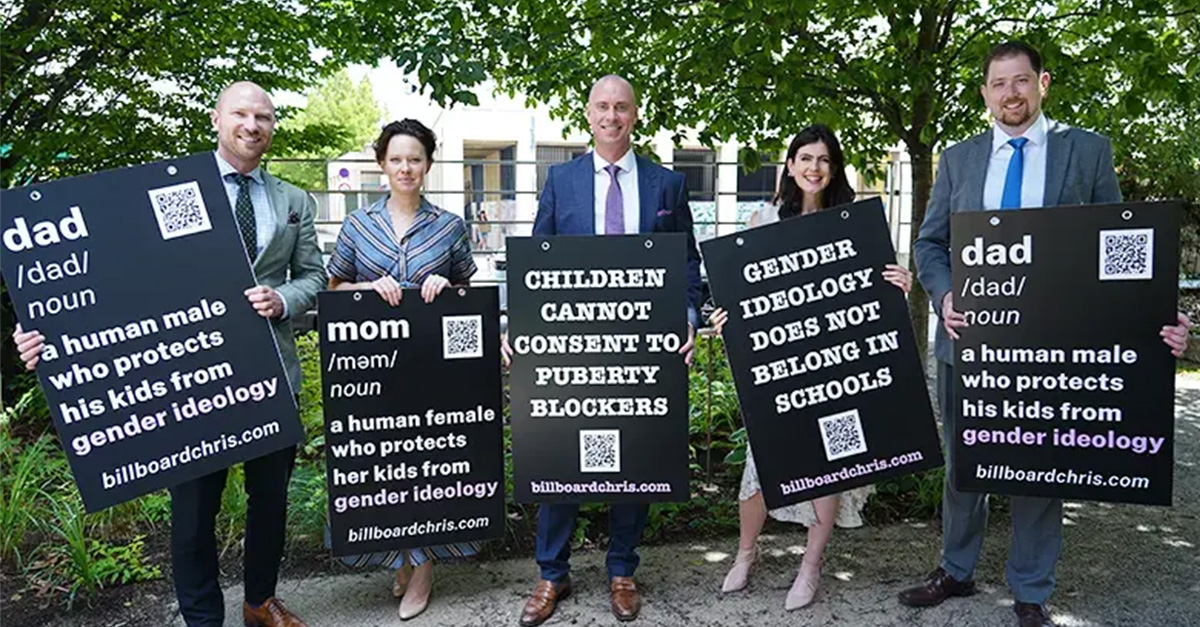


Get a free copy of Parental Rights & Education when you subscribe to our newsletter!

Every system of thought carries fundamental assumptions about the nature of reality, mankind, and ethics, which is why our schools should reject the humanist beliefs currently being proselytized in our classrooms and return to the Christian principles that made our children good and our country great.
Recent efforts to integrate the Bible into student programming and display the Ten Commandments in public schools have reignited a fierce debate about religion’s role in education.
But here’s the twist: Religion is already deeply entrenched in our classrooms — just not the kind that the media is alarmed about.
Take, for instance, the quick backlash from critics over Oklahoma’s plan to give students a “complete understanding of Western Civilization” by weaving Scripture into the syllabi. The Interfaith Alliance, a progressive organization, labeled the initiative as “blatant religious coercion” and a “Christian nationalist” ploy. Meanwhile, the left’s favorite evangelical errand boy, David French, called Louisiana’s new law mandating that the Ten Commandments be posted on school grounds a “version of Christian mysticism.”
This hyperventilating, though, misses a crucial point: There is no such thing as a theologically neutral environment, and there never will be.
Every system of thought carries fundamental assumptions about the nature of reality, mankind, and ethics. These assumptions form the bedrock of what we call worldviews — and yes, that includes secular ones, too, which is what the classroom offers now.
Our government schools, for example, have their own creation account — Darwinian evolution, despite the details being laughably absurd. They set their moral priorities by dedicating an entire month to celebrating everything gay and censoring traditional views that contend in opposition. Moreover, they rewrite history by downplaying America’s Christian heritage in textbooks while offering their own path to salvation through identity politics and economic collectivism.
These selections aren’t random choices. Not only do they reflect a naturalistic outlook, but they include the core infrastructure of any religion: A story on the origin of life, a doctrine of right and wrong, and a grand vision for redemption.
As Professor Richard A. Baer wisely noted, “Education never takes place in a moral and philosophical vacuum.” He added that if “the larger questions about human beings and their destiny are not being asked and answered within a predominantly Judeo-Christian framework, they will be addressed with another philosophical or religious framework — but hardly one that is ‘neutral.’”
How true that is.
In fact, secularists have long recognized the power of public education in forming beliefs and discipling the next generation. Author and activist John J. Dunphy, writing in The Humanist more than four decades ago, was shockingly blunt about how to stir this “new faith” within America’s youth.
Read every single line of this passage, for it’s an honesty you rarely get from leftists nowadays:
“I am convinced that the battle for humankind’s future must be waged and won in the public school classroom by teachers who correctly perceive their role as the proselytizers of a new faith: a religion of humanity that recognizes and respects the spark of what theologians call divinity in every human being. These teachers must embody the same selfless dedication as the most rabid fundamentalist preachers, for they will be ministers of another sort, utilizing a classroom instead of a pulpit to convey humanist values in whatever subject they teach, regardless of the educational level — preschool day care or large state university.
The classroom must and will become an arena of conflict between the old and the new — the rotting corpse of Christianity, together with all its adjacent evils and misery, and the new faith of humanism, resplendent in its promise of a world in which the never-realized Christian ideal of ‘love thy neighbor’ will finally be achieved.”
Ministers? Pulpits? Proselytizers? Sounds an awful lot like religion, doesn’t it?
Yet that kind of religion is acceptable to progressives because it removes the divine from the equation and places man at the center of the universe instead. With God out of the picture, man gets to make the rules and set the standards, or so he thinks, at least.
Public intellectual John Dewey was another progressive who saw humanism as having “all the elements for a religious faith,” one whose advocacy needed to be “explicit and militant.”
For those who don’t know, Dewey is widely regarded as the single most influential figure in molding modern public education.
Coincidence?
Of course not.
Charles Potter, a colleague of Dewey’s and co-signatory of the original Humanist Manifesto, recognized government schools as “the most powerful ally of humanism,” far outweighing the impact of Christian catechism on any given Sunday.
He wrote, “What can theistic Sunday school, meeting for an hour once a week, and teaching only a fraction of the children, do to stem the tide of a five-day program of humanistic teachings?”
So why are progressives suddenly reluctant to acknowledge that humanism is clearly a religion enforced by taxpayer money? They certainly weren’t shy about pushing this cause in Dewey’s day.
The late atheist Paul Kurtz spilled the beans, admitting in a 1994 book that “if humanism, even naturalistic and secular humanism, is a religion, then we would be faced with a violation of the First Amendment to the United States Constitution.”
Bingo.
Thus, after World War II, there was a clever rebranding effort to repackage anti-Christian dogmas as “state neutrality.” However, this was actually the “establishment of a religion of secularism,” as Justice Potter Stewart remarked in his 1963 dissent from a Supreme Court decision that banned Bible reading and the Lord’s Prayer from official school activities.
Given that theological presuppositions are inescapable, it makes sense to embrace the Christian attitudes that have underpinned our freedom, anchored our prosperity, and shaped our moral character.
After all, if we’re going to have religion in the classroom, shouldn’t we choose the one that’s been instrumental in making children good and making America great?
As seen in this article, many K-12 schools now embrace the secular woke agenda and are hostile to Christian beliefs and parental rights. Fortunately, parents don’t have to settle for this. Liberty University Online Academy is a K-12 program designed to educate your children in the ways of the Lord while preparing them to stand firm in their faith when they graduate. Our flexible online curriculum ensures that your student is trained at your convenience and keeps YOU the ultimate educator of your children.
